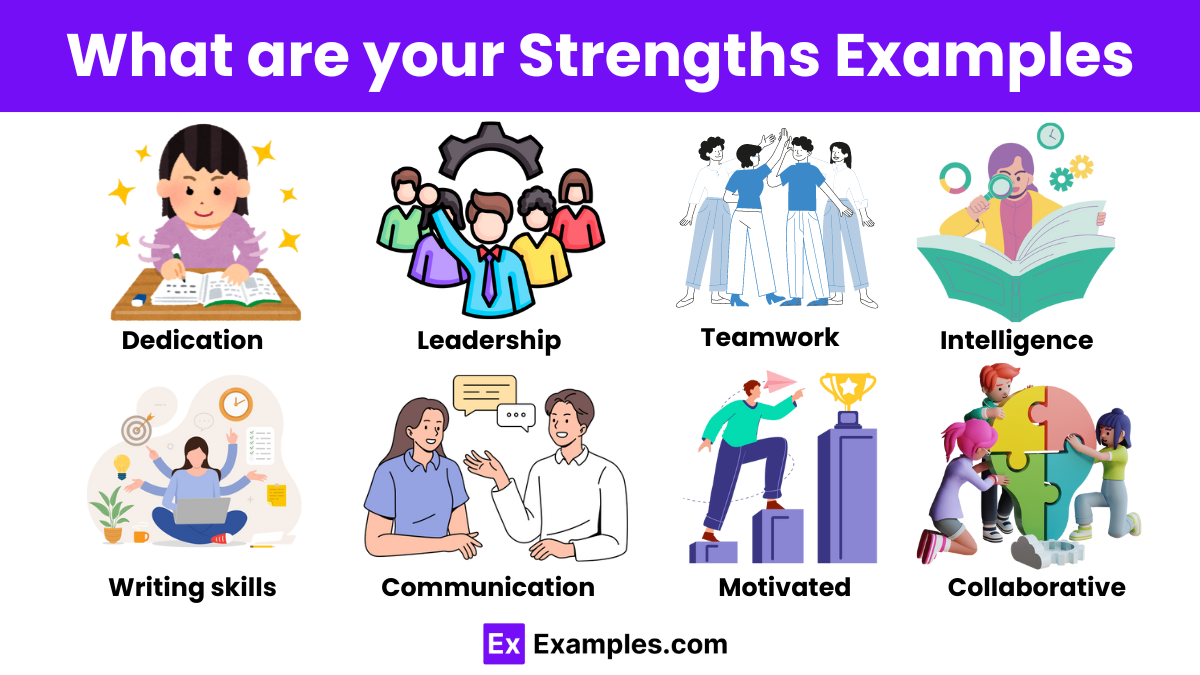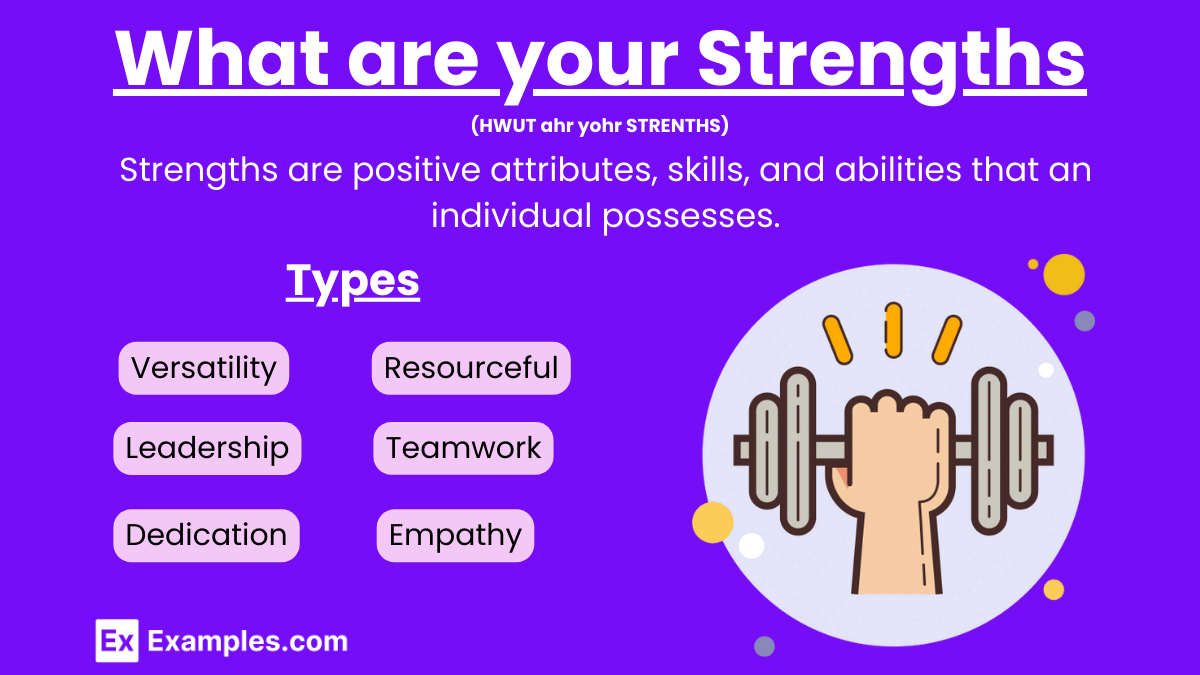What are your Strengths? – 23+ Examples
Understanding and articulating your strengths is crucial for personal and professional development. Your strengths are the qualities, skills, and attributes that you excel in and that distinguish you from others. They are the foundation of your success and can guide you in making informed decisions about your career, education, and personal life. Recognizing your personal strengths allows you to leverage them effectively, helping you achieve your goals and contribute positively to your team or organization. Identifying communication strengths is particularly important, as effective communication can enhance your ability to lead, collaborate, and solve problems. Assessing your strengths and weaknesses provides a balanced view, allowing you to address areas for improvement while maximizing your inherent capabilities.
What are your Strengths?
Strengths are positive attributes, skills, and abilities that an individual possesses. These qualities contribute to their success and effectiveness in various aspects of life, such as work, personal relationships, and personal growth. Strengths can be inherent traits or developed through experience and practice. Understanding one’s skills can be enhanced by using skills assessment tips to identify areas of proficiency and areas for improvement. Setting clear objectives of communication skills is essential for developing effective interpersonal interactions and professional communication. A well-crafted resume skills summary can highlight an individual’s key strengths and abilities, showcasing their qualifications and making a strong impression on potential employers.
What are your Strengths Examples

- Attention to detail
- Patient
- Dedication
- Versatility
- Leadership
- Intelligence
- Interpersonal skills
- Resourceful
- Teamwork
- Empathy
- Adaptable
- Writing skills
- Communication
- Motivated
- Collaborative
- Initiative
- Passionate
- Work ethics
How to Answer “What are your Strengths?”
1. Identify Your Strengths
- Reflect on your skills, experiences, and feedback from others to determine your key strengths.
- Consider strengths that are relevant to the job you are applying for.
2. Choose Relevant Strengths
- Select strengths that align with the job description and the needs of the employer.
- Ensure they are qualities that you genuinely possess and can provide examples for.
3. Provide Specific Examples
- For each strength you mention, provide a specific example of how you have demonstrated this strength in a professional setting.
- Use the STAR method (Situation, Task, Action, Result) to structure your examples.
4. Connect to the Job Role
- Explain how your strengths will help you succeed in the role you are applying for.
- Highlight how your strengths can benefit the company and contribute to its goals.
5. Be Confident and Genuine
- Speak confidently about your strengths without appearing arrogant.
- Be honest and ensure your strengths accurately represent your abilities.
Example Answer:
Interviewer: “What are your strengths?”
You: “One of my key strengths is my ability to communicate effectively. In my previous role as a project manager, I led a team of 10 people and successfully completed a major project ahead of schedule. By maintaining open lines of communication, I ensured everyone was on the same page and that any issues were addressed promptly. Additionally, my problem-solving skills are another strength. For instance, when we encountered a significant roadblock in our project timeline, I devised a new strategy that not only solved the problem but also saved the company 15% in projected costs. These strengths, combined with my passion for continuous improvement, make me confident that I can contribute effectively to your team and help achieve your company’s objectives.”
What are your Strengths at Work
- Strong Communication Skills: Clearly convey ideas and information.
- Problem-Solving Abilities: Analyze issues and develop effective solutions.
- Time Management: Efficiently organize and prioritize tasks to meet deadlines.
- Leadership Skills: Inspire and guide a team towards achieving goals.
- Adaptability: Adjust to new conditions and unexpected challenges.
- Attention to Detail: Ensure accuracy and thoroughness in completing tasks.
- Collaboration and Teamwork: Work well with others to achieve common goals.
- Technical Proficiency: Expertise in specific technical skills relevant to the job.
- Creativity and Innovation: Generate new ideas and approaches.
- Customer Focus: Dedication to meeting the needs and expectations of customers.
What are your Strengths for Students
- Strong Communication: Ability to articulate thoughts clearly and effectively in both written and verbal forms.
- Problem-Solving Skills: Capability to analyze problems and develop practical solutions.
- Time Management: Efficiently organizing and prioritizing tasks to meet academic deadlines.
- Adaptability: Flexibility to adjust to new subjects, teaching styles, and learning environments.
- Teamwork: Working well with peers on group projects and collaborative tasks.
- Critical Thinking: Evaluating information logically to make reasoned judgments and decisions.
- Creativity: Coming up with innovative ideas and solutions in projects and assignments.
- Self-Motivation: Driven to achieve personal and academic goals without needing external encouragement.
- Attention to Detail: Carefully completing assignments and projects with accuracy.
- Leadership: Taking initiative and guiding peers in group activities and projects.
What is your Greatest Strengths
- Communication: Excellent ability to clearly convey ideas and information.
- Problem-Solving: Strong capability to analyze issues and develop effective solutions.
- Time Management: Efficiently organize and prioritize tasks to meet deadlines.
- Leadership: Ability to inspire and guide a team towards achieving goals.
- Adaptability: Flexibility to adjust to new conditions and unexpected challenges.
- Attention to Detail: Meticulous consideration and accuracy in completing tasks.
- Collaboration: Effective teamwork and ability to work well with others.
- Technical Proficiency: Expertise in relevant technical skills and tools.
- Creativity: Generate innovative ideas and approaches.
- Customer Focus: Dedication to meeting the needs and expectations of customers.
What are your Strengths for Academic
- Analytical Thinking: Ability to critically evaluate and interpret data.
- Research Skills: Proficient in conducting thorough and effective research.
- Time Management: Efficiently organizing and prioritizing academic tasks.
- Writing Proficiency: Strong skills in writing essays, reports, and research papers.
- Public Speaking: Confidence and clarity in presenting ideas and findings.
- Collaboration: Effective teamwork and ability to work well with peers on group projects.
- Problem-Solving: Skilled in identifying issues and developing solutions.
- Attention to Detail: Ensuring accuracy and thoroughness in academic work.
- Creativity: Innovative thinking in developing ideas and projects.
- Adaptability: Flexibility in adjusting to new academic challenges and environments.
Tips to Answer “What are your Strengths”
- Identify Relevant Strengths: Choose strengths that align with the job description and the company’s needs.
- Be Honest: Mention genuine strengths that you possess and can demonstrate.
- Use Specific Examples: Provide concrete examples to illustrate each strength.
- Be Concise: Keep your answers brief and to the point.
- Highlight Unique Strengths: Mention any unique strengths that set you apart from other candidates.
- Connect to the Role: Explain how your strengths will help you succeed in the specific role you’re applying for.
- Show Enthusiasm: Express enthusiasm and confidence when discussing your strengths.
- Prepare in Advance: Think about your strengths and examples beforehand to articulate them clearly during the interview.
How can I identify my strengths?
Reflect on past successes, ask for feedback from others, and take strength assessment tests to identify your natural abilities and talents.
Why is it important to know my strengths?
Knowing your strengths helps you focus on areas where you excel, boosting confidence, productivity, and overall satisfaction in personal and professional life.
How do strengths differ from skills?
Strengths are inherent qualities, while skills are learned abilities. Strengths often enhance the development and application of skills.
Can strengths change over time?
Yes, strengths can evolve with experience, practice, and personal growth, allowing you to develop new strengths and improve existing ones.
How can I leverage my strengths at work?
Identify tasks that align with your strengths, seek roles that utilize them, and communicate your strengths to colleagues and supervisors.
What are examples of common strengths?
Common strengths include communication, problem-solving, leadership, empathy, creativity, adaptability, and resilience.
How can I use my strengths in a job interview?
Highlight relevant strengths by providing specific examples of how they contributed to your past achievements and how they align with the job requirements.
How do strengths impact teamwork?
Strengths contribute to effective teamwork by allowing individuals to complement each other’s abilities, leading to increased collaboration and better outcomes.
Can weaknesses become strengths?
Yes, with self-awareness and effort, you can work on weaknesses and potentially turn them into strengths over time.
How do strengths relate to personal goals?
Aligning personal goals with your strengths increases the likelihood of achieving them and maintaining motivation and satisfaction.



